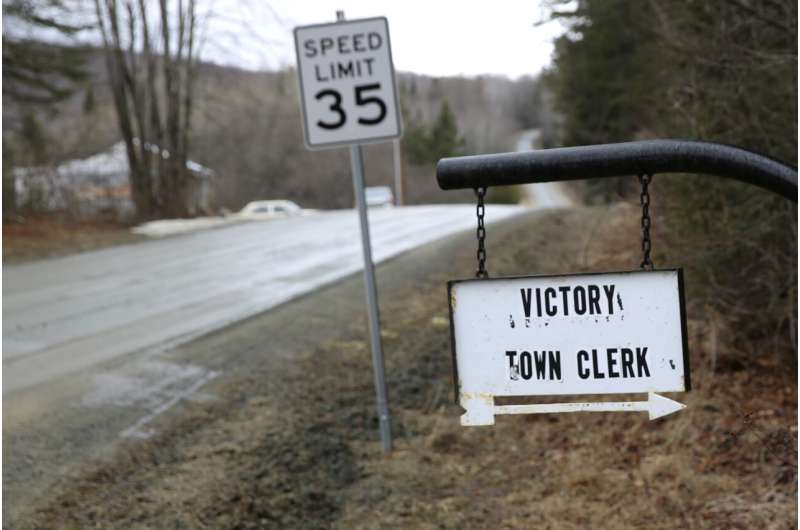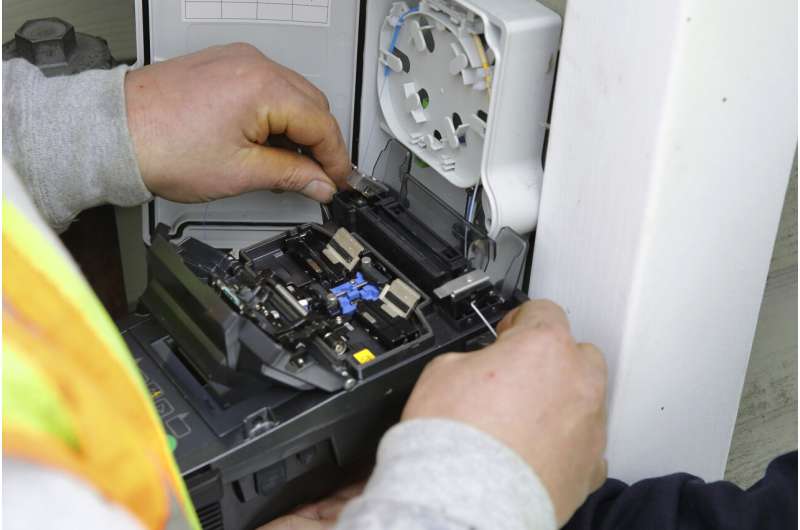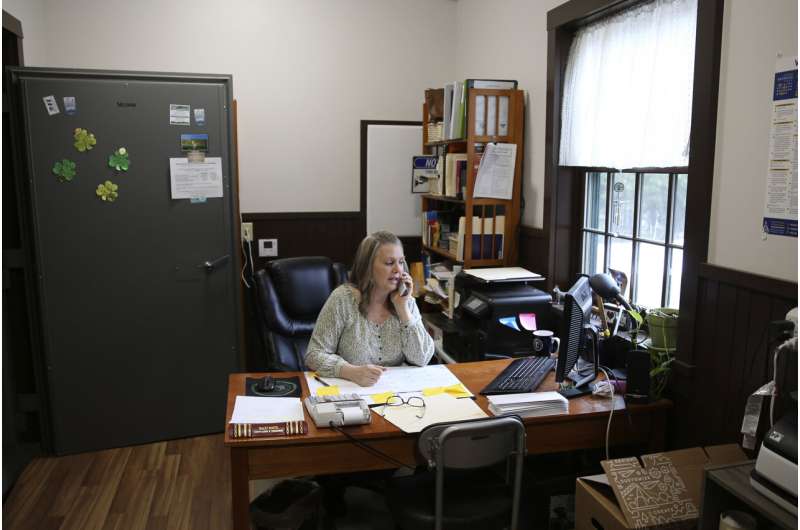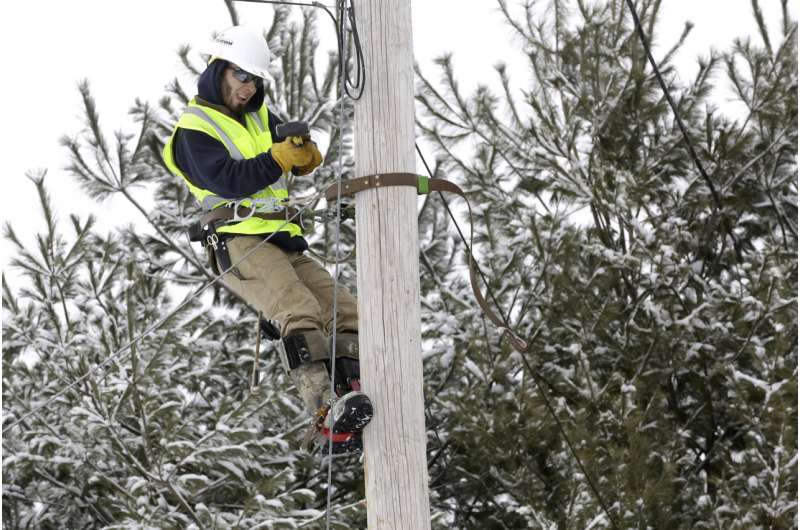Lots of broadband money, but US expansion finds speed bumps
For the 70-or-so people who live in the remote Vermont community of Victory, Town Clerk Tracey Martel says she’s regularly frustrated watching a spinning circle on her computer while she tries to complete even the most basic municipal chores online.
“Fast internet would be really good,” said Martel, whose community was one of the last in Vermont to receive electricity almost 60 years ago. The DSL service she has now works for basic internet, but it can be spotty and it doesn’t allow users to access all the benefits of the interconnected world.
About 5 miles (8 kilometers) away as the bird flies in the neighboring community along Miles Pond in the town of Concord, a new fiber optic line is beginning to bring truly high-speed internet to residents of the remote area known as the Northeast Kingdom.
“I’m looking forward to high-speed internet, streaming TV,” said Concord resident John Gilchrist, as a crew ran fiber optic cable to his home earlier this year.
The fiber optic cable that is beginning to serve the remote part of Concord and will one day serve Victory is being provided through NEK Broadband, a utility of nearly 50 Vermont towns working to bring high speed internet service to the most remote parts of the state.
NEK Broadband Executive Director Christa Shute said the group’s business plan calls for offering services to all potential customers within five years, but given current supply constraints and the shortage of trained technicians, she’s beginning to think that goal isn’t achievable.
“I think our build will take seven to 10 years,” she said.

Congress has appropriated tens of billions of dollars for a variety of programs to help fill the digital gap exposed by the pandemic when millions of people were locked down in their homes with no way to study, work or get online medical care.
The first of those funds are reaching municipalities, businesses and other groups involved in the effort, but some say supply chain issues, labor shortages and geographic constraints will slow the rollout.
The demand for fiber optic cable goes beyond wired broadband to homes and businesses. The cable will help provide the 5G technology now being rolled out by wireless communications providers.
But there’s a bottleneck in the supply. Michael Bell, senior vice president and general manager of Corning Optical Communications based in Charlotte, North Carolina, says the issue lies with supply of the protective jacket that surrounds the hair-thin strands of glass that carry information on beams of light.
Currently, some working to expand broadband say delays in getting the fiber optic cable they need can exceed a year.
“Based on the capacity we’re adding, and the capacity we see our competitors adding, wait times will start going down dramatically as the year progresses and into next year,” Bell said. “And I think as we get into next year, the lead time for most customers is going to be well under a year.”
Meanwhile, there’s a labor shortage for installing the cable. Many in the industry are setting up educational programs to train people to work with the fiber, said Jim Hayes, the president of the Santa Monica, California-based Fiber Optic Association.

“It needs to be done now,” said Hayes. “We’re going to need to train probably ten techs for every tech that we’ve got who’s competent to lead them.”
The Infrastructure Investment and Jobs Act, the $1.5 trillion infrastructure bill passed last fall, says that areas that receive broadband speeds of less than 25 megabit downloads and 3 megabit uploads are considered unserved. To qualify for different federal grants through the infrastructure bill and other programs, most finished projects must offer speeds of at least 100 megabits per second for downloads. Upload speeds differ, but most federal grants have a minimum of 20 megabit uploads.
For comparison, it takes 80 seconds to download a 1 gigabyte video at the speed of 100 megabits per second. It takes four times as long—320 seconds, or more than 5 minutes—at 25 megabits per second.
The National Telecommunications and Information Administration, a part of the Agency of Commerce, which is funding broadband projects across the country through the infrastructure law, is neutral about about how internet service providers reach the speed requirements. Many providers say the key to bringing true high-speed internet service to the entire country is to install fiber optic cable to every nook and cranny.
Deploying high-speed internet in tribal communities and rural areas across the western United States where distances dwarf those of rural northern New England will be even more of a challenge.
Broadband access on the Navajo Nation—the largest reservation in the U.S. at 27,000 square miles (69,930 square kilometers) in Arizona, New Mexico and Utah—is a mix of dial-up, satellite service, wireless, fiber and mobile data.
The U.S. Department of the Interior, which has broad oversight of tribal affairs, said federal appraisals, rights-of-way permits, environment reviews and archaeological protection laws can delay progress.

The argument against the wireless options currently being used in some areas is they can’t offer speeds needed to qualify for the federal grants.
Mike Wendy of the Wireless Internet Service Providers Association said wireless technology is getting faster and more reliable and wireless connections could be the only way to reach some of the most remote locations.
“The challenge of all this money is to make sure that the unserved are served,” said Wendy, whose organization represents about 1,000 fixed wireless internet providers. “Our guys are in those markets right now and they’re growing.”
Ohio Lt. Gov. Jon Husted said $233 million in state dollars will be used in his state to expand broadband to over 43,000 households. Other internet service providers have agreed to expand broadband to another 51,000 households. Ohio is expected to receive an additional $268 million in federal funding to further broadband expansion in the state.
Husted said Ohio is focused on infrastructure while groups and organizations are needed to provide computers and to help people adapt to the fast-growing digital age.
“We’re building the road,” Husted said. “Access to broadband is like the highway system. That’s where we’re focused. It doesn’t mean there are people who don’t need cars or need driver’s licenses.”
There are still scattered locations across the country that rely on dialup and some people in remote locations use satellite internet services. Some people have no internet options whatsoever.

Martel, the Victory town clerk, said that when the people from NEK Broadband visited the community they told residents it would be five to seven years before fiber optic cable would reach the community.
But Shute says her organization is hoping to get a grant to connect the most rural areas, which could move the timeline for Victory up to three years.
Meanwhile, back in East Concord, after having the service for several weeks, Gilchrist said he and his daughter Emily, who is 19 and headed to college in a few months, no longer have to go to the local diner to use the internet. He canceled his expensive satellite TV service, his daughter and her friends have been using it to play online video games and in a few months she will be using the connection while doing college studies.
“It’s been working great, as far as I’m concerned, all I do is check email,” Gilchrist said. “I don’t watch TV, but my daughter loves it.”
© 2022 The Associated Press. All rights reserved. This material may not be published, broadcast, rewritten or redistributed without permission.
Citation:
Lots of broadband money, but US expansion finds speed bumps (2022, April 13)
retrieved 13 April 2022
from https://techxplore.com/news/2022-04-lots-broadband-money-expansion.html
This document is subject to copyright. Apart from any fair dealing for the purpose of private study or research, no
part may be reproduced without the written permission. The content is provided for information purposes only.
For all the latest Technology News Click Here
For the latest news and updates, follow us on Google News.
